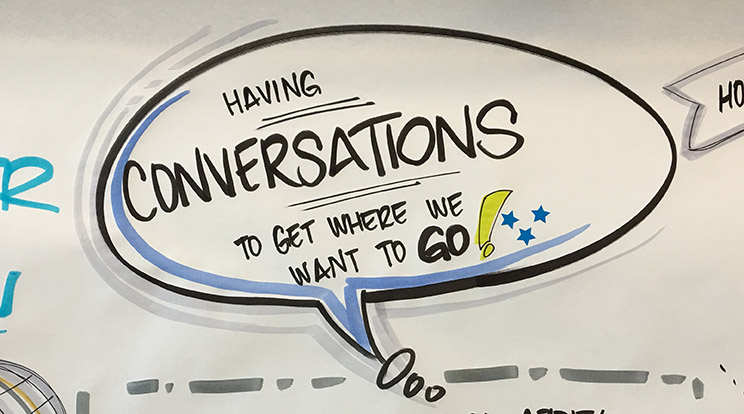How many times have you been in a place where you were willing to give up something you love due to a perception that it was too hard to confront the situation and easier to remain silent or run away? It is important to realize that this can cause a “disconnect” and it puts in jeopardy purposes and commitments about which you care deeply.
We have all been there: perceived unjustifiable accusation has worn us down and brought us to a place where we want to run from the situation. I think we can all relate to that horrible feeling of seeing our hard work crumble and what we have been so vested in put at risk.
Susan* is a coaching client who recently demonstrated the importance of connecting well and the risks to personal purpose when we allow our pride to stand in the way of finding real connection through a powerful intersection.
For years, Susan had been responsible for managing the main manufacturing supply chain process at work. She loved the company she worked for and the job she was doing. Despite many challenges throughout the years, she had always been able to meet her goals. This year, however, was different: Susan did not quite meet her numbers, and revenue goals were missed, putting peoples’ bonuses at risk.
Consequently, Susan’s boss came to her indicating something needed to change or she would be in danger of losing her job. Susan was devastated – and mad. Having spent years dedicating herself to her work and successfully reaching her goals, the threat of dismissal after her first shortcoming left Susan feeling hurt and betrayed. When she came to me, it was to gain advice on how to quit the company and find another job. She was “done with being taken advantage of.”
I asked Susan about her real purpose for being at the company. She teared up and began sharing how, in addition to her belief in the company’s mission, she was committed to making a difference in the lives of those who worked for her and dedicated to seeing them flourish and be fulfilled in their work.
When I asked her what it would take for her to stay in her job, Susan balked, saying it was too late and her mind was made up. I persisted, and asked her to just imagine the conditions that could allow her to stay. She decided she would need to know that this company still cared about its employees and their wellbeing as much as it cared for the customers.
Finally, I asked Susan to consider what her boss cared about that had caused him to express his disappointment in her so artlessly. It took a little digging, but Susan concluded that her boss probably wanted to see the customers’ needs met and her performance this year jeopardized not only that, but the rewards of her employees. I extended the question to, “What do you think you both care deeply about?” Again, Susan initially struggled to put aside her emotions, but was able to recognize that she had known her boss for many years and knew he really did care about the employees and making a difference in the world. Even though how this situation was handled was very hurtful to her, she knew her boss really was more interested in the impact this company was making than the money.
Over the next 30 minutes of discussion, Susan began to open herself up to the possibility that the way for her to stay engaged in the company would require having an authentic conversation with her boss. A conversation that not only considered her commitments and concerns, but also her boss’ commitments and concerns. As hard as it would be to have this conversation, Susan began to realize she had a choice; there was more than one way out of this tough situation. She realized that she may not have to sacrifice her dreams and fulfillment for the seductive enticement of being right, and… disconnected. It was at the intersection of the purpose Susan shared with her boss, that she was able to find a launching point for reconnecting.
Susan had the conversation with her boss. And, while she did ultimately end up leaving the company, she did it as a choice over what she cared deeply about and not out of fear-based reaction. In my last conversation with her, she indicated that she left with her relationship with her boss intact – something she previously thought was not even possible.
At the intersection of my view, your view, and the facts, we reveal common ground, meaningful work, and the possibility of long-lived relationships. Finding the intersection starts with a commitment to focus on where we both agree, choosing to place our focus on what we have in common rather than what it is that drives us apart. Of course, this is even more difficult because our natural tendency seems to be to start our conversations with disagreement, which triggers defensiveness and makes resolution hard and long. Many times we put relationships and passions at risk because we see no other course of action. Doing so actually minimizes our own futures.
Finding intersection may not manifest itself in a complete reconciliation of differences. However, it does illuminate the common stakes and provides a launching point for a conversation that was previously unthinkable.
Are you facing resistance? Are your priorities and ideas being discounted, disapproved of or criticized? Maybe it’s time to get curious about the larger purposes you may share and find a way to discuss the intersection you have. Maybe, just maybe, there are possibilities available that can create greater vitality in your life if you are interested enough to pursue the magic of connection, instead of falling into the seductive safety of disconnection.
What have you given up on and become victim to? Make a list of those folks you need to get reconnected to today! Take control away from your fears and put yourself back as the author of your future.
* Name changed for confidentiality




